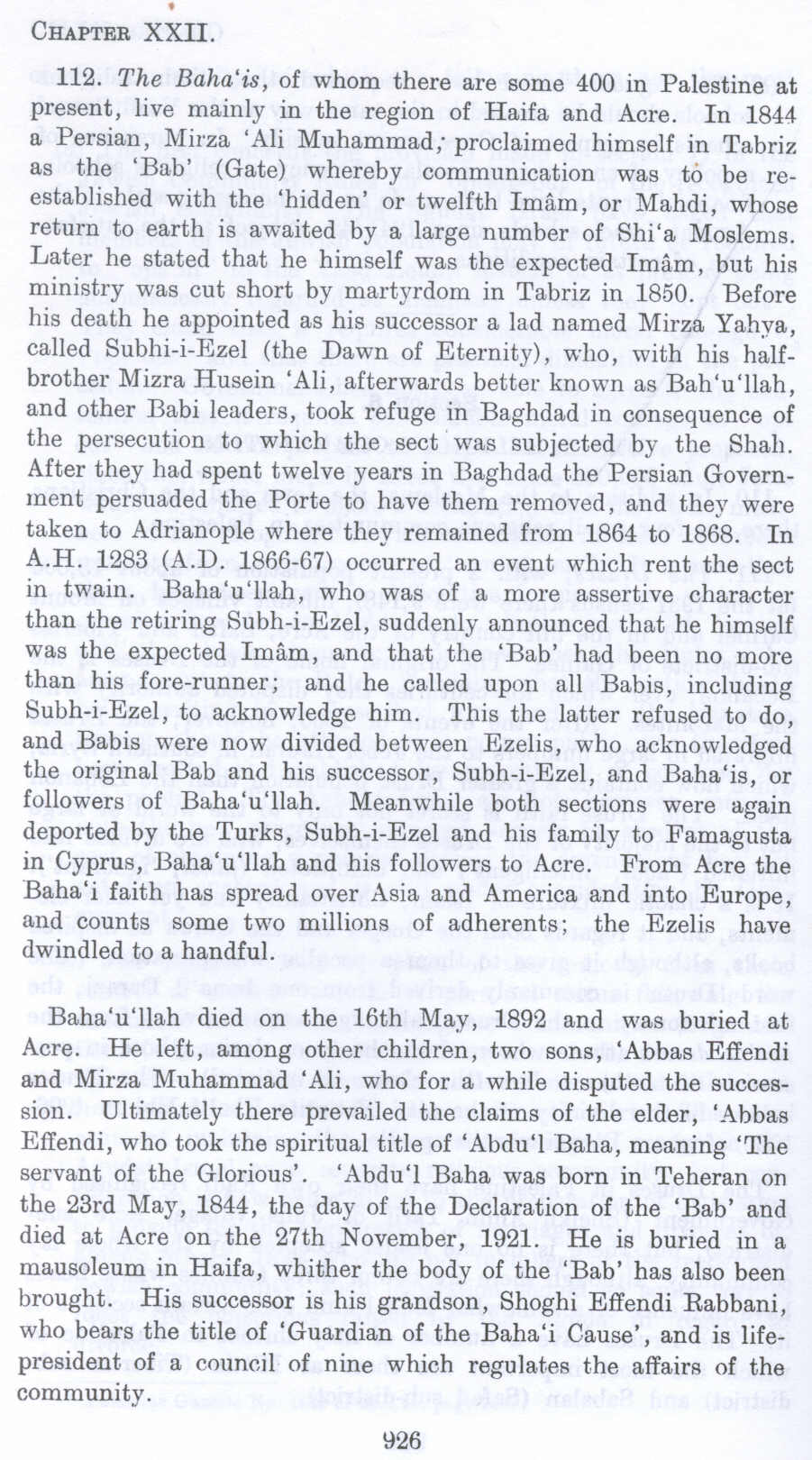| Prev | Next |  |
| Prev | Next |
| PalestineRemembered | About Us | Oral History | العربية | |
| Pictures | Zionist FAQs | Haavara | Maps | |
| Search |
| Camps |
| Districts |
| Acre |
| Baysan |
| Beersheba |
| Bethlehem |
| Gaza |
| Haifa |
| Hebron |
| Jaffa |
| Jericho |
| Jerusalem |
| Jinin |
| Nablus |
| Nazareth |
| Ramallah |
| al-Ramla |
| Safad |
| Tiberias |
| Tulkarm |
| Donate |
| Contact |
| Profile |
| Videos |
British Mandate: A Survey of Palestine: Volume II - Page 926 |
Disclaimer
The above documents, article, interviews, movies, podcasts, or stories reflects solely the research and opinions of its authors. PalestineRemembered.com makes its best effort to validate its contents.


Post Your Comment
*It should be NOTED that your email address won't be shared, and all communications between members will be routed via the website's mail server.
112. The Baha'is, of whom there are some 400 in Palestine at present, live mainly in the region of Haifa and Acre. In 1844 a Persian, Mirza 'Ali Muhammad; proclaimed himself in Tabriz as the 'Bab' (Gate) whereby communication was to be reestablished with the 'hidden' or twelfth Imam, or Mahdi, whose return to earth is awaited by a large number of Sbi'a Moslems. Later be stated that he himself was the expected Imam, but his ministry was cut short by martyrdom in Tabriz in 1850. Before his death he appointed as his successor a lad named Mirza Yahya, called Subhi-i-Ezel (the Dawn of Eternity), who, with his half brother Mizra Husein 'Ali, afterwards better known as Bah'u'llah, and other Babi leaders, took refuge in Baghdad in consequence of the persecution to which the sect was subjected by the Shah. After they had spent twelve years in Baghdad the Persian Government persuaded the Porte to have them removed, and they were taken to Adrianople where they remained from 1864 to 1868. In A.H. 1283 (A.D. 1866-67) occurred an event which rent the sect in twain. Baha'u'Ilah , who was of a more assertive character than the retiring Subh-i-Ezel, suddenly announced that be himself was the expected Imam, and that the 'Bab' had been no more than his fore-runner; and he called upon all Babis, including Subh-i-Ezel , to acknowledge him. This the latter refused to do, and Babis were now divided between Ezelis, who acknowledged the original Bab and his successor, Subh-i-Ezel, and Baha'is, or followers of Bahau'Ilah. Meanwhile both sections were again deported by the Turks, Subh-i-Ezel and his family to Famagusta in Cyprus, Baha'u'Ilah and his followers to Acre. From Acre the Baha'i faith has spread over Asia and America and into Europe, and counts some two millions of adherents; the Ezelis have dwindled to a handful.
Baha'u'llah died on the 16th May, 1892 and was buried at Acre. He left, among other children, two sons, 'Abhas Effendi and Mirza Muhammad 'Ali, who for a while disputed the succession. Ultimately there prevailed the claims of the elder, 'Abhas Effendi, who took the spiritual title of 'Abdu'I Baba, meaning 'The servant of the Glorious'. 'Abdu'l Baba was born in Teheran on the 23rd May, 1844, the day of the Declaration of the 'Bab' and died at Acre on the 27th November, 1921. He is buried in a mausoleum in Haifa, whither the body of the 'Bab' has also been brought. His successor is his grandson, Shogbi Effendi Rabbani, who bears the title of 'Guardian of the Baha'i Cause', and is life president of a council of nine which regulates the affairs of the community.
926